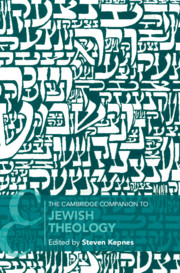Book contents
- The Cambridge Companion to JEWISH THEOLOGY
- cambridge companions to religion
- the cambridge companion to JEWISH THEOLOGY
- Copyright page
- Contents
- Notes on Contributors
- Acknowledgements
- 1 Introduction
- 2 What is Jewish Theology?
- Part I Biblical-Rabbinic
- Part II Medieval
- Part III Modern
- Part IV Contemporary Issues
- 12 The Holocaust and Jewish Theology
- 13 Theology and Halakhah in Jewish Feminisms
- 14 Jewish Models of Revelation
- 15 Jewish Theology of Religions
- Part V Analytic Philosophy and Theology
- Index
- Other Titles in the Series (continued from page ii)
- References
12 - The Holocaust and Jewish Theology
from Part IV - Contemporary Issues
Published online by Cambridge University Press: 03 December 2020
- The Cambridge Companion to JEWISH THEOLOGY
- cambridge companions to religion
- the cambridge companion to JEWISH THEOLOGY
- Copyright page
- Contents
- Notes on Contributors
- Acknowledgements
- 1 Introduction
- 2 What is Jewish Theology?
- Part I Biblical-Rabbinic
- Part II Medieval
- Part III Modern
- Part IV Contemporary Issues
- 12 The Holocaust and Jewish Theology
- 13 Theology and Halakhah in Jewish Feminisms
- 14 Jewish Models of Revelation
- 15 Jewish Theology of Religions
- Part V Analytic Philosophy and Theology
- Index
- Other Titles in the Series (continued from page ii)
- References
Summary
The central theological questions raised for Jewish belief by the Holocaust concern the existence and nature of God. In this paper, I focus on four figures who addressed these theological questions in a serious way: Richard Rubenstein, Eliezer Berkovits, Irving Greenberg, and Hans Jonas. I show that Jonas’s argument for a limited and changing God is the most radical of these theological responses and that the radical character of his response can best be appreciated by contrasting his approach with the other three theological accounts, especially in terms of how the problem of theodicy functions in those accounts.
- Type
- Chapter
- Information
- The Cambridge Companion to Jewish Theology , pp. 267 - 296Publisher: Cambridge University PressPrint publication year: 2020

